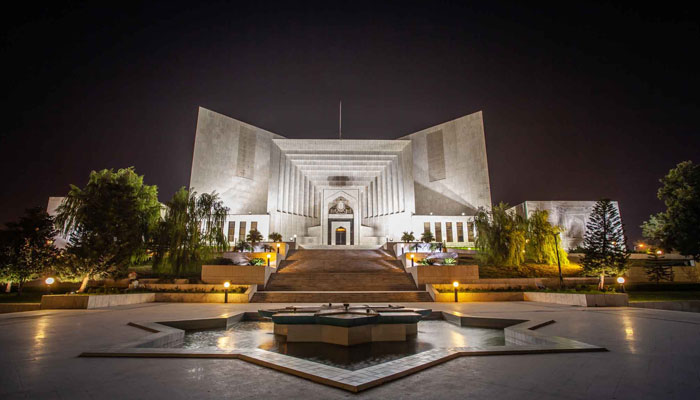ROs should exercise discretionary powers carefully: SC
“Returning officers are an integral part of the electoral process," judges remarked
ISLAMABAD: The Supreme Court has said a returning officer should exercise the discretionary powers available to him in a rational and meticulous manner.
As the alleged massive rigging in the recent general elections held on February 8 is widely criticized and the Election Commission of Pakistan’s role is being questioned, the Supreme Court has issued an important judgment on the role of returning officers (ROs).
A three-member SC bench, headed by Justice Munib Akhtar and comprising Justice Shahid Waheed and Justice Irfan Saadat Khan, issued a detailed judgment in a petition challenging a verdict of the Lahore High Court.
“Returning officers are an integral part of the electoral process and it is highly unbecoming of a returning officer to exercise the authority conferred upon him or her in a manner which sabotages the electoral process,” says the detailed judgment authored by Justice Irfan Saadat Khan.
The court observed that returning officers must remember that it was a fundamental right of an individual to contest elections and if they sabotaged an individual, not only do they rob the individual of their fundamental right but also rob the populace at large of voting for that individual, which was also a fundamental right protected by the Constitution.
Elections are the bedrock of a democracy. Therefore, it is essential that those wishing to contest elections be facilitated as far as legally permissible. “It goes without saying that it is against democratic norms and principles to add technical bottlenecks in the way of any individual, who is a citizen of this country, trying to contest elections,” said the judgment, adding that electoral laws and rules could not be used as an arbitrary filtering mechanism dependent on the whims of a returning officer. The court, therefore, said a returning officer should exercise the discretionary powers available to him in a rational and meticulous manner.
“There is nothing on the record to suggest that the ‘joint bank account’ which is at the forefront of the list before us was not being exclusively used by the petitioner and his wife,” said the detailed judgment. It added that when the legislature had already mandated that the declaration required for nomination for election would be that of opening an exclusive bank account or dedicating an existing bank account, it was beyond the legislative competence of the ECP to require that such a bank account would not be a joint signatory account.
“At this juncture, it is quite clear to us that the legislature did not envision such a bifurcation and therefore the proviso added by the ECP (and that too a mere eight days prior to the date of filing nomination papers) is a violation and beyond the scope of its parent statute,” said the judgment.
-
 Royal Family's Approach To Deal With Andrew Finally Revealed
Royal Family's Approach To Deal With Andrew Finally Revealed -
 Super Bowl Weekend Deals Blow To 'Melania' Documentary's Box Office
Super Bowl Weekend Deals Blow To 'Melania' Documentary's Box Office -
 Meghan Markle Shares Glitzy Clips From Fifteen Percent Pledge Gala
Meghan Markle Shares Glitzy Clips From Fifteen Percent Pledge Gala -
 Melissa Jon Hart Explains Rare Reason Behind Not Revisting Old Roles
Melissa Jon Hart Explains Rare Reason Behind Not Revisting Old Roles -
 Meghan Markle Eyeing On ‘Queen’ As Ultimate Goal
Meghan Markle Eyeing On ‘Queen’ As Ultimate Goal -
 Japan Elects Takaichi As First Woman Prime Minister After Sweeping Vote
Japan Elects Takaichi As First Woman Prime Minister After Sweeping Vote -
 Kate Middleton Insists She Would Never Undermine Queen Camilla
Kate Middleton Insists She Would Never Undermine Queen Camilla -
 King Charles 'terrified' Andrew's Scandal Will End His Reign
King Charles 'terrified' Andrew's Scandal Will End His Reign -
 Winter Olympics 2026: Lindsey Vonn’s Olympic Comeback Ends In Devastating Downhill Crash
Winter Olympics 2026: Lindsey Vonn’s Olympic Comeback Ends In Devastating Downhill Crash -
 Adrien Brody Opens Up About His Football Fandom Amid '2026 Super Bowl'
Adrien Brody Opens Up About His Football Fandom Amid '2026 Super Bowl' -
 Barbra Streisand's Obsession With Cloning Revealed
Barbra Streisand's Obsession With Cloning Revealed -
 What Did Olivia Colman Tell Her Husband About Her Gender?
What Did Olivia Colman Tell Her Husband About Her Gender? -
 'We Were Deceived': Noam Chomsky's Wife Regrets Epstein Association
'We Were Deceived': Noam Chomsky's Wife Regrets Epstein Association -
 Patriots' WAGs Slam Cardi B Amid Plans For Super Bowl Party: She Is 'attention-seeker'
Patriots' WAGs Slam Cardi B Amid Plans For Super Bowl Party: She Is 'attention-seeker' -
 Martha Stewart On Surviving Rigorous Times Amid Upcoming Memoir Release
Martha Stewart On Surviving Rigorous Times Amid Upcoming Memoir Release -
 Prince Harry Seen As Crucial To Monarchy’s Future Amid Andrew, Fergie Scandal
Prince Harry Seen As Crucial To Monarchy’s Future Amid Andrew, Fergie Scandal




